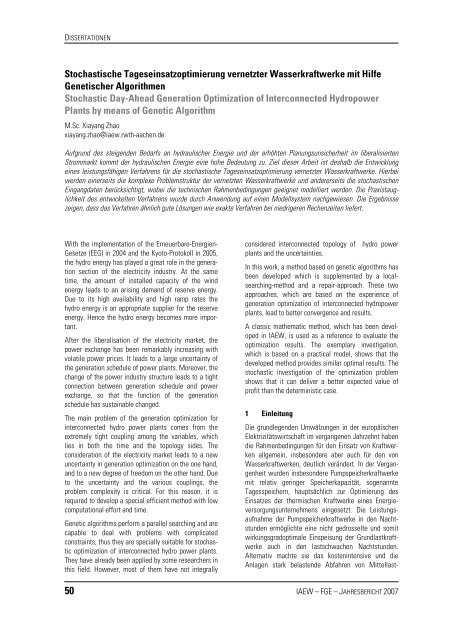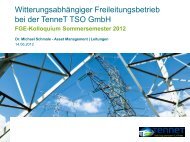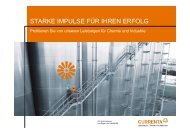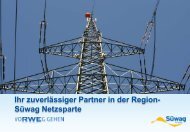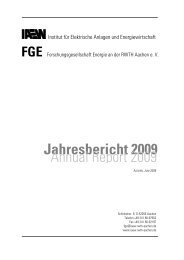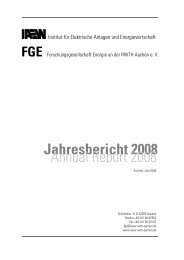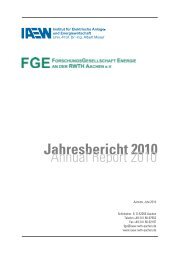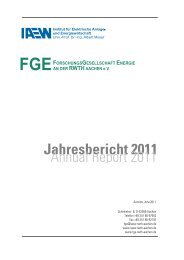Jahresbericht 2007 - FGE - RWTH Aachen University
Jahresbericht 2007 - FGE - RWTH Aachen University
Jahresbericht 2007 - FGE - RWTH Aachen University
Sie wollen auch ein ePaper? Erhöhen Sie die Reichweite Ihrer Titel.
YUMPU macht aus Druck-PDFs automatisch weboptimierte ePaper, die Google liebt.
DISSERTATIONEN<br />
Stochastische Tageseinsatzoptimierung vernetzter Wasserkraftwerke mit Hilfe<br />
Genetischer Algorithmen<br />
Stochastic Day-Ahead Generation Optimization of Interconnected Hydropower<br />
Plants by means of Genetic Algorithm<br />
M.Sc. Xiayang Zhao<br />
xiayang.zhao@iaew.rwth-aachen.de<br />
Aufgrund des steigenden Bedarfs an hydraulischer Energie und der erhöhten Planungsunsicherheit im liberalisierten<br />
Strommarkt kommt der hydraulischen Energie eine hohe Bedeutung zu. Ziel dieser Arbeit ist deshalb die Entwicklung<br />
eines leistungsfähigen Verfahrens für die stochastische Tageseinsatzoptimierung vernetzter Wasserkraftwerke. Hierbei<br />
werden einerseits die komplexe Problemstruktur der vernetzten Wasserkraftwerke und andererseits die stochastischen<br />
Eingangdaten berücksichtigt, wobei die technischen Rahmenbedingungen geeignet modelliert werden. Die Praxistauglichkeit<br />
des entwickelten Verfahrens wurde durch Anwendung auf einen Modellsystem nachgewiesen. Die Ergebnisse<br />
zeigen, dass das Verfahren ähnlich gute Lösungen wie exakte Verfahren bei niedrigeren Rechenzeiten liefert.<br />
With the implementation of the Erneuerbare-Energien-<br />
Gesetze (EEG) in 2004 and the Kyoto-Protokoll in 2005,<br />
the hydro energy has played a great role in the generation<br />
section of the electricity industry. At the same<br />
time, the amount of installed capacity of the wind<br />
energy leads to an arising demand of reserve energy.<br />
Due to its high availability and high ramp rates the<br />
hydro energy is an appropriate supplier for the reserve<br />
energy. Hence the hydro energy becomes more important.<br />
After the liberalisation of the electricity market, the<br />
power exchange has been remarkably increasing with<br />
volatile power prices. It leads to a large uncertainty of<br />
the generation schedule of power plants. Moreover, the<br />
change of the power industry structure leads to a tight<br />
connection between generation schedule and power<br />
exchange, so that the function of the generation<br />
schedule has sustainable changed.<br />
The main problem of the generation optimization for<br />
interconnected hydro power plants comes from the<br />
extremely tight coupling among the variables, which<br />
lies in both the time and the topology sides. The<br />
consideration of the electricity market leads to a new<br />
uncertainty in generation optimization on the one hand,<br />
and to a new degree of freedom on the other hand. Due<br />
to the uncertainty and the various couplings, the<br />
problem complexity is critical. For this reason, it is<br />
required to develop a special efficient method with low<br />
computational effort and time.<br />
Genetic algorithms perform a parallel searching and are<br />
capable to deal with problems with complicated<br />
constraints, thus they are specially suitable for stochastic<br />
optimization of interconnected hydro power plants.<br />
They have already been applied by some researchers in<br />
this field. However, most of them have not integrally<br />
considered interconnected topology of hydro power<br />
plants and the uncertainties.<br />
In this work, a method based on genetic algorithms has<br />
been developed which is supplemented by a localsearching-method<br />
and a repair-approach. These two<br />
approaches, which are based on the experience of<br />
generation optimization of interconnected hydropower<br />
plants, lead to better convergence and results.<br />
A classic mathematic method, which has been developed<br />
in IAEW, is used as a reference to evaluate the<br />
optimization results. The exemplary investigation,<br />
which is based on a practical model, shows that the<br />
developed method provides similar optimal results. The<br />
stochastic investigation of the optimization problem<br />
shows that it can deliver a better expected value of<br />
profit than the deterministic case.<br />
1 Einleitung<br />
Die grundlegenden Umwälzungen in der europäischen<br />
Elektrizitätswirtschaft im vergangenen Jahrzehnt haben<br />
die Rahmenbedingungen für den Einsatz von Kraftwerken<br />
allgemein, insbesondere aber auch für den von<br />
Wasserkraftwerken, deutlich verändert. In der Vergangenheit<br />
wurden insbesondere Pumpspeicherkraftwerke<br />
mit relativ geringer Speicherkapazität, sogenannte<br />
Tagesspeichern, hauptsächlich zur Optimierung des<br />
Einsatzes der thermischen Kraftwerke eines Energieversorgungsunternehmens<br />
eingesetzt. Die Leistungsaufnahme<br />
der Pumpspeicherkraftwerke in den Nachtstunden<br />
ermöglichte eine nicht gedrosselte und somit<br />
wirkungsgradoptimale Einspeisung der Grundlastkraftwerke<br />
auch in den lastschwachen Nachtstunden.<br />
Alternativ machte sie das kostenintensive und die<br />
Anlagen stark belastende Abfahren von Mittellast-<br />
50 IAEW – <strong>FGE</strong> – JAHRESBERICHT <strong>2007</strong>


